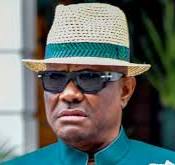Samuel Marshall
A quiet storm is gathering within the walls of Aso Rock. The fragile alliance between President Bola Ahmed Tinubu and his once-formidable ally, the Minister of the Federal Capital Territory (FCT), Nyesom Wike, appears to be fracturing. The latest sign of strain came in the form of an empty chair at last week’s Council of State meeting – a gesture that has set tongues wagging across Nigeria’s political circles.
Reliable sources within the Presidency confirmed that Wike, who was expected at the high-level gathering, stayed away without prior notice. Insiders interpreted his absence as a “subtle protest” against Tinubu’s refusal to endorse his preferred candidate for the position of Chairman of the Independent National Electoral Commission (INEC). “Wike had made his preference clear,” a senior Presidency official told The Guardian. “He wanted Justice Abdullahi Liman, but the President chose Professor Joash Amupitan instead. That was a message Wike understood without needing further explanation.”
However, aides to the FCT Minister offered a different version. According to his spokesman, Wike merely “delegated” his junior, Dr. Mariya Mahmoud Bunkure, to represent him.
Yet a video released by Sahara Reporters on Friday 10th October appeared to contradict that account. The footage showed Dr. Bunkure leaving midway through a housing-sector event – allegedly on Wike’s instruction – to attend the Council meeting.
Political observers have noted the irony in the controversy. Ministers are not statutory members of the Council of State under the 1999 Constitution, and as The Guardian pointed out, Wike’s absence cannot technically be described as a “boycott.” But in Nigerian politics, optics often outweigh legality – and the symbolism of that empty seat was unmistakable.
At the heart of the feud lies President Tinubu’s appointment of Prof. Joash Ojo Amupitan (SAN), a Kogi-born law professor and corporate governance expert, as the new INEC Chairman, succeeding Prof. Mahmood Yakubu. The appointment, swiftly ratified by the Council of State, was celebrated by the Presidency as proof that “competence, not politics,” remains the cornerstone of Tinubu’s administration.
But in Wike’s camp, the move is viewed differently – as a calculated slight and a sign that his once-direct access to the President’s inner circle is waning.
“Wike played a pivotal role in Tinubu’s 2023 victory,” said a senior PDP chieftain in Port Harcourt who requested anonymity. “He expected a level of reciprocity. But Tinubu’s loyalty has always been to himself.”
Prof. Amupitan’s credentials, however, are widely respected. A Senior Advocate of Nigeria since 2014 and former Dean of Law at the University of Jos, he has authored more than 60 scholarly papers. Several civic groups have already hailed his nomination, describing him as “neutral, cerebral, and reform-minded.”
If confirmed by the Senate, Amupitan will supervise the upcoming Anambra governorship election and the 2026 FCT Area Council polls – two politically charged contests that will test both his independence and Tinubu’s reformist credibility.
Meanwhile, reports emerging around October 9, 2025, indicate that the Presidency has discreetly curtailed Wike’s routine monthly press briefings. According to insiders, the decision was prompted by concerns over his increasingly combative remarks. Officials say the move is intended to “preserve the delicate balance” within the administration, limiting Wike’s media appearances to only those “strategically approved.”
Wike’s aides have dismissed these reports as “fake news.”
Nonetheless, sources close to the Minister say he was deeply unsettled by the restrictions. Known for his bluntness, Wike’s recent silence has raised more questions than answers.
“When Wike goes quiet, something is in motion,” observed Dr. Dorkoru Elenwa, a Port Harcourt-based political analyst. “He’s a master strategist – his silence usually precedes a calculated strike.”
This would not be Wike’s first brush with presidential frost. As Rivers State governor, he frequently clashed with institutions under former President Muhammadu Buhari, including the police and the judiciary, over control of political narratives.
His alliance with Tinubu, analysts say, was never ideological but transactional – a pact born of mutual necessity during the turbulent 2023 elections, when Wike and his G-5 colleagues defied the PDP establishment and lent covert support to Tinubu’s bid.
Now, as whispers of alienation grow louder, some political watchers believe the once-formidable partnership is nearing its end.
“The marriage of convenience may be heading for a messy divorce,” wrote columnist Tony Opara in Vanguard. “Wike’s influence in the Villa is clearly fading – and he knows it.”
For now, the Villa appears unperturbed. Senior presidential aides have dismissed talk of a rift as “speculative gossip,” insisting that governance remains on course.
“The President is not in any fight with anyone,” a top aide told Premium Times. “Appointments are based on merit and national interest. The Council of State meeting was a routine affair, not a battleground.”
Yet, the symbolism remains potent. An empty seat in a room full of Nigeria’s past and present leaders rarely goes unnoticed.
The Senate’s forthcoming screening of Amupitan could provide the next flashpoint. Analysts believe Wike’s political network in the National Assembly might quietly test its strength during the confirmation hearings.
Beyond the INEC episode, Abuja insiders suggest that the FCT portfolio itself could come under review in Tinubu’s anticipated cabinet reshuffle early next year – a move that could further strain relations with Wike or push him into renewed political activism.
For now, the once-boisterous minister has chosen silence – an uncharacteristic pause that has everyone guessing.
“Wike is never idle,” a former Rivers lawmaker mused. “When he retreats, it means he’s plotting.”
Whether that plotting leads to reconciliation or confrontation may define one of the most intriguing subplots of Nigeria’s current political season.***

